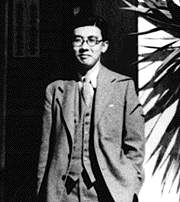Masaru Ibuka
| Masaru Ibuka 井深 大 |
|
|---|---|

Masaru Ibuka, co-founder of Sony
|
|
| Born |
11 April 1908 |
| Died | 19 December 1997 (aged 89) Tokyo, Japan |
| Cause of death | Heart failure |
| Nationality | Japanese |
| Education | Waseda University |
| Known for | Sony |
| Spouse(s) | Sekiko Maeda |
| Children | 3 |
| Awards | IEEE Founders Medal (1972) |
Masaru Ibuka (井深 大 Ibuka Masaru; 11 April 1908 – 19 December 1997) was a Japanese electronics industrialist and co-founder of Sony.
Ibuka graduated from Waseda University in 1933, he then went to work at Photo-Chemical Laboratory, a company which processed movie film, and later served in the Imperial Japanese Navy during World War II, being a member of the Imperial Navy Wartime Research Committee. In 1946, he left the company and navy, and founded a bombed out radio repair shop in Tokyo.
In 1946 Ibuka and Akio Morita co-founded Sony Corporation, originally named Tokyo Telecommunications Engineering Corporation (prior to 1958). Ibuka was instrumental in securing the licensing of transistor technology to Sony from Bell Labs in the 1950s, thus making Sony one of the first companies to apply transistor technology to non-military uses. Ibuka served as president of Sony from 1950 to 1971, and then served as chairman of Sony between 1971 and 1976, when he retired from the company.
Ibuka was awarded the Medal of Honor with Blue Ribbon in 1960, and was decorated with the Grand Cordon of the Order of the Sacred Treasure in 1978 and with the Grand Cordon of the Order of the Rising Sun in 1986. He was further decorated as a Commander First Class of the Royal Order of the Polar Star of Sweden in that year, named a Person of Cultural Merit in 1989 and decorated with the Order of Culture in 1992.
Ibuka received Honorary Doctorates from the Sophia University, Tokyo in 1976, from the Waseda University, Tokyo in 1979, and from Brown University (USA) in 1994. The IEEE awarded him the IEEE Founders Medal in 1972 and named the IEEE Masaru Ibuka Consumer Electronics Award after him in 1987.
...
Wikipedia
